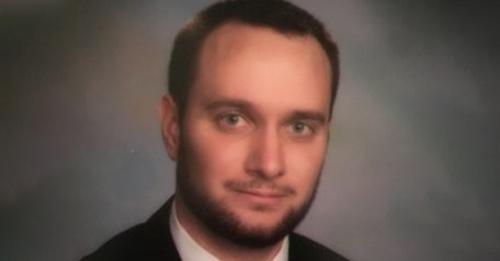
IMAGE: Vincent Graber is a PhD candidate in the Department of Mechanical Engineering and Mechanics at Lehigh University.
view more
Credit: Courtesy of Vincent Graber/Lehigh University
A good student doesn’t necessarily equate to a good researcher, says Eugenio Schuster, a professor of mechanical engineering and mechanics in Lehigh University’s P.C. Rossin College of Engineering and Applied Science.
Every now and then, however, Schuster has a doctoral student like Vincent Graber, whom he deems exceptional in both roles. Graber’s research skills will be put to the test in September, when he is scheduled to begin work on a project related to burn control in fusion reactors, done with support from the U.S. Department of Energy.
Graber was notified by email in April that his research project was chosen to receive a highly competitive award from the DOE’s Office of Science Graduate Student Research program. The SCGSR program supports select U.S. graduate students as they “pursue part of their graduate thesis research at a DOE laboratory/facility in areas that address scientific challenges central to the Office of Science mission,” according to its website.
He recalls being en route to an auto-repair shop in his hometown of Williamstown, New Jersey, when the good news arrived in his inbox.
“I had nervous excitement about it,” says Graber, who is in his third year of PhD studies in mechanical engineering.
Upon receiving the SCGSR email, Graber’s immediate actions were informing his father, who was with him for the trip to the auto shop, and forwarding the message to Schuster, who promptly called to offer his congratulations.
Graber’s measured response to the news about the DOE award, which will cover his incremental costs associated with travel and living expenses, seems to fall in line with Schuster’s image of him.
“Vincent is a student of few words; he’s shy in that sense,” says Schuster, who joined the Rossin College faculty in 2004.
But Graber isn’t reserved when it comes to research.
The professor adds, “Vincent has the quality that I look for in my PhD students, which is the capability of working independently, the capability of looking for the actions of research without asking me every step they need to take.”
A strong Lehigh connection
Graber says his interest in active control of the nuclear-fusion plasma, the ionized gas at around 100 million degree where the reactions take place, was piqued through conversations with Dan Boyer, a former student in Schuster’s Plasma Control Group, and reading Boyer’s papers on the subject. Boyer is now a staff research physicist at New Jersey’s Princeton Plasma Physics Laboratory (PPPL), where Graber will work on his research project.
In his research proposal, titled “Towards a More Realistic Assessment of Zero-dimensional Burn-control Techniques in ITER via One-dimensional Simulations Based on TRANSP,” Graber explains that one of the greatest challenges in operating fusion power reactors is regulating fusion power, aka burn control. The regulation of plasma’s kinetics is essential to the 35-nation energy project under construction in southern France called ITER (pronounced ee-ter, which in Latin means “the way”).
There is a lot at stake with ITER, which aims to become the first fusion device to produce net energy and the first to maintain fusion for extended periods. ITER will be the world’s largest atom-fusing tokamak machine, with 10 times the plasma chamber volume of the tokamak at the DIII-D National Fusion Facility in San Diego. Designed to produce 500 megawatts of fusion power from 50 megawatts of input heating power–a ten-fold return on energy–ITER is expected to be operational by 2025.
As the first tokamak designed to operate burning plasmas, ITER requires numerical testing, Graber writes in his proposal. As such, he will work with PPPL research physicists Boyer and Francesca Poli using the firm’s TRANSP, a one-dimensional predictive simulation code, to conduct a series of tasks, among them developing burn-control functionality.
“The end goal of this project is to get a better sense of the validity of how effective burn controllers are,” says Graber.
“In ITER, we will not have time for control design or tuning controllers,” adds Schuster. “The controllers, when you turn them on for the first time, will need to work–that’s it. The only way of doing this that we know is to try to get more and more sophisticated models of what’s going on in ITER and try to run simulations to test that the controller will work.”
Throughout the course of Graber’s research project, which is expected to be completed within seven months, Schuster will continue to serve as his advisor, reviewing reports and participating in regular meetings via videoconference and in person.
Schuster’s counseling of Graber on this project is all part of a long-term connection: “I want my students to have successful futures. I always tell them, ‘Seeing you do your best is the best for me because you’re going to be my students forever.’ “
###
Related Links:
TDnews














